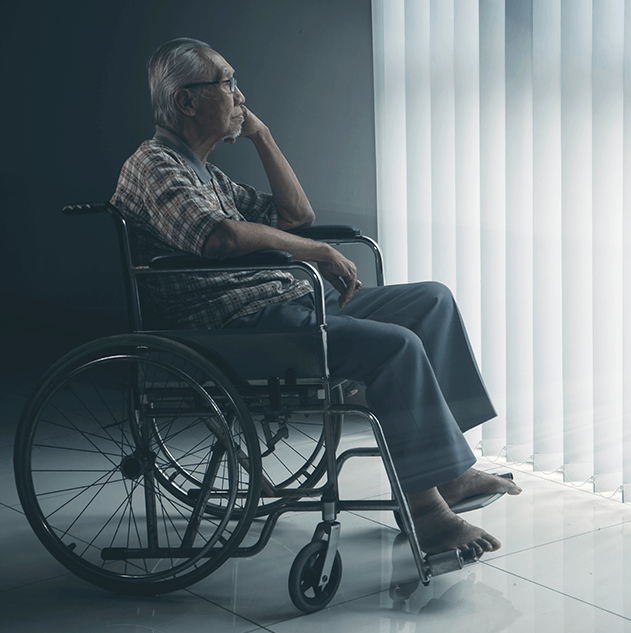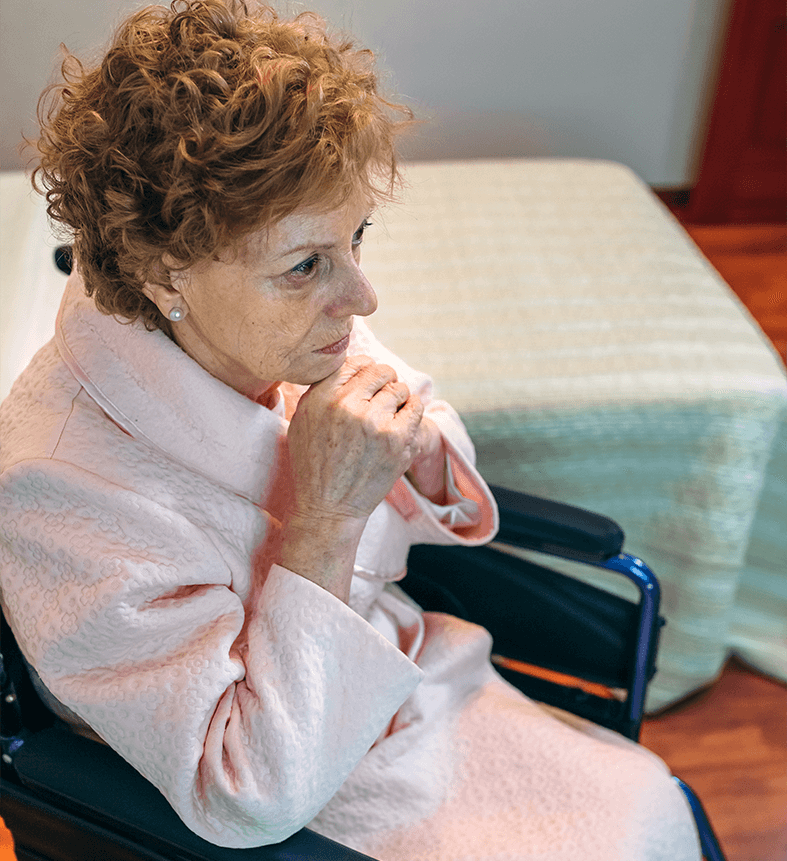
★★★★★
We absolutely can’t thank you enough.
Powers & Santola was so knowledgeable and caring. I was so very fortunate to find such a great law firm.
Caring Nursing Home Abuse
Attorneys in Albany, NY
Elderly and ill individuals who live in nursing homes are vulnerable to abuse at the hands of staff members and other residents. Watchdog groups like the National Center on Elder Abuse says that hundreds of thousands of elderly people suffer abuse, but the actual scope of the problem is unknown. For every case of abuse reported to programs and agencies, 24 went unreported, a New York State Elder Abuse Prevalence Study found.
Abuse in the nursing home setting is a crime. In addition to criminal charges against those who abuse nursing home residents, civil law may also allow abuse victims to recover compensation. This may include money for additional medical care necessary for recovery from physical or emotional injury, and for pain and suffering caused by the abuse.
Use of Antipsychotic Medications in Nursing Homes is Major Concern
The Alzheimer’s Association states that “dementia” is a blanket term that is used to describe the many different symptoms associated with a person’s decline in memory and thinking. The most common types of dementia are Alzheimer’s disease and vascular dementia, which often result from a stroke.
Because dementia residents may wander or become aggressive due to their condition, nursing homes that are inadequately staffed may give them antipsychotic medications, which are powerful sedatives. When medically unwarranted, the administration of antipsychotic medication may violate a nursing home resident’s right to be free of chemical restraints.
Additionally, antipsychotic medications and antidepressants are known to increase the risk of death among dementia patients, including exposing them to the heightened risk of suffering a fall, according to a recent NPR report. The U.S. Food and Drug Administration (FDA) clearly states that it has never approved of using antipsychotics to treat dementia-related psychosis.
“Furthermore,” the FDA states, “there is no approved drug for the treatment of dementia-related psychosis. Healthcare professionals should consider other management options.”
Proposal Focuses on Staff Training, Monitoring of Antipsychotic Medications
Under the recent White House proposal, a nursing home’s staff would be required to receive proper training in the care of residents with dementia and in preventing elder abuse. Each nursing home would be allowed to determine the proper length and format of the training.
The Centers for Medicare and Medicaid Services (CMS) has published a dementia education and abuse prevention training series online. The CMS states that nursing homes can use the series and avoid additional costs for training materials.
The White House has also proposed a rule that would require nursing home pharmacists to monitor drugs prescribed to residents for excessive periods of time or with other irregularities, and it would require that the resident’s physician explain the need for the medication in the resident’s records.
The Importance and Impact of this Proposal
More than 15,000 nursing homes and other long-term residential care facilities that depend on Medicare and Medicaid payments to fund the care of 1.5 million residents would be affected by the proposed rule changes, the U.S. Department of Health and Human Services (HHS) states.
As required by law, the proposed rules are subject to a 60-day public comment period before final adoption. You can check out the Federal Register to review the Reform of Requirements for Long-Term Care Facilities (CMS-3260-P) that are being proposed.
To comment, simply visit www.regulations.gov before September 15, enter the ID number and click on “Submit a Comment.”
If you believe that your elderly loved one has suffered abuse in a nursing home in Albany, Syracuse or surrounding areas in New York State, please contact Powers & Santola, LLP, to receive a free review of your case.
Contact Us
With offices in Albany, Syracuse, and Rochester, the attorneys at Powers & Santola, LLP, represent victims of nursing home abuse throughout New York State. We fight for appropriate restitution as well as to end the abuse.
Contact us now for a free review of your claim.
Common Types of
Nursing Home Abuse
Abuse of elderly, vulnerable or dependent adults occurs regularly in nursing homes, assisted-living facilities and other long-term residential care settings, the National Center on Elder Abuse (NCEA) says. In one recent study, more than half of the nursing home staff members surveyed admitted to mistreating older patients within the prior year.
Nursing home abuse takes several forms, including:
- Physical abuse – Use of force that results in bodily injury, pain, or impairment. It includes being slapped, burned, cut or bruised, excessive or improper use of restraints, or forced ingestion of food or medication.
- Emotional and psychological abuse – Inflicting mental or emotional pain, anguish or distress by threat, humiliation, intimidation, or other abusive conduct.
- Sexual abuse – Non-consensual sexual contact of any kind is abuse, including forcing sexual contact with the perpetrator or with a third person. Coercing a nursing home resident into watching sexual behavior or pornography is also abuse.
- Financial exploitation – Misuse or concealment of funds, property or assets through fraud, embezzlement, forgery, falsifying records, coerced property transfers, or denial of access to assets.
Institutional abuse – mistreatment occurring in a nursing home, assisted-living facility, group home, board and care facility, foster home or another similar facility – is usually perpetrated by someone with a legal or contractual obligation to provide some type of care or protection to the victim, the NCEA says. Nursing home abuse can also be at the hands of fellow residents, particularly sexual abuse.
Take Legal Action
Against Nursing Home Abuse
The Department of Health, Nursing Home, and ICF/MR Surveillance is responsible for investigating complaints about abuse at nursing homes in New York State. The department’s investigations determine whether a facility has failed to meet federal and state requirements.
In cases where the department determines the nursing home has violated regulations, the department may issue a citation. The facility then must submit a plan of correction that is acceptable to the department and correct the deficient practice.
However even if there is a successful state investigation, it does not address the harm done to an individual nursing home resident. This requires a lawsuit seeking to hold the nursing home and/or its managers and employees liable for the abused resident’s medical expenses, pain and suffering, and other losses.
Addressing Liability
Nursing homes can be held liable for abusive actions perpetrated by employees. An investigation may find that responsible personnel knew or should have known about the abuse.
Nursing homes are also responsible for screening employees who come into contact with residents. They may be held liable if negligent recruitment practices lead to hiring individuals unsuited for providing proper care to residents.
Contact an Experienced Attorney
At Powers & Santola, LLP, we help New York families get answers. We work to hold parties accountable when there are allegations of abuse in a nursing home or other long-term care facilities. We can help you file a complaint with the state and fully investigate your case to seek satisfactory results for you and your family.

Contact a Nursing Home Abuse Lawyer
in Upstate New York
If your loved one has complained about or shown signs of abuse in a nursing home, take action today. Our firm serves clients in Albany, Syracuse, Rochester, and throughout New York.
Contact an experienced and compassionate lawyer at Powers & Santola, LLP, online or by phone. We’ll provide a free initial legal consultation and won’t accept any legal fees until you obtain compensation.
Call Today! (518) 465-5995
Other Practice Areas
Delayed Cancer
Diagnosis
Surgical
Malpractice
Wrongful
Death
Personal
Injury
Auto
Accidents
Medical
Malpractice
Changing Lives for the Better
When someone injures you, your life gets turned upside down. Suddenly, you may face a ton of medical bills. You may be unable to work or help out around the home. Others may need to care for you around the clock. Nothing is the same.
view all practice areas

2026 Ⓒ Powers & Santola, LLP. All rights reserved. Privacy Policy | Site Map
The information you obtain at this site is not, nor is it intended to be, legal advice. You should consult an attorney for advice regarding your individual situation. We invite you to contact us and welcome your calls, letters and electronic mail. Contacting us does not create an attorney-client relationship. Please do not send any confidential information to us until such time as an attorney-client relationship has been established.